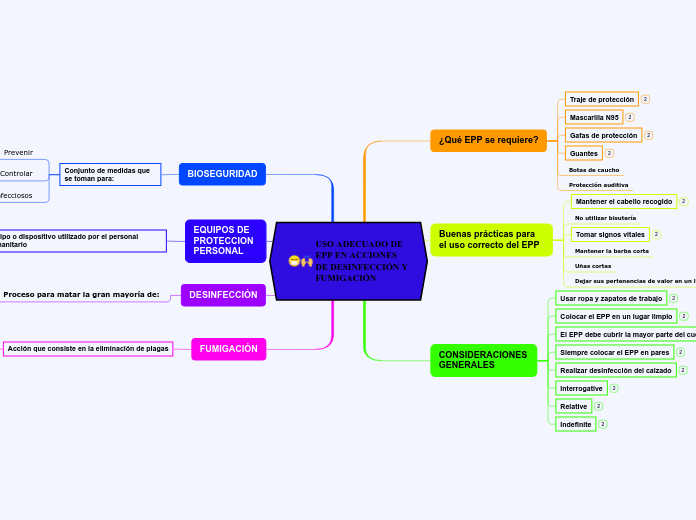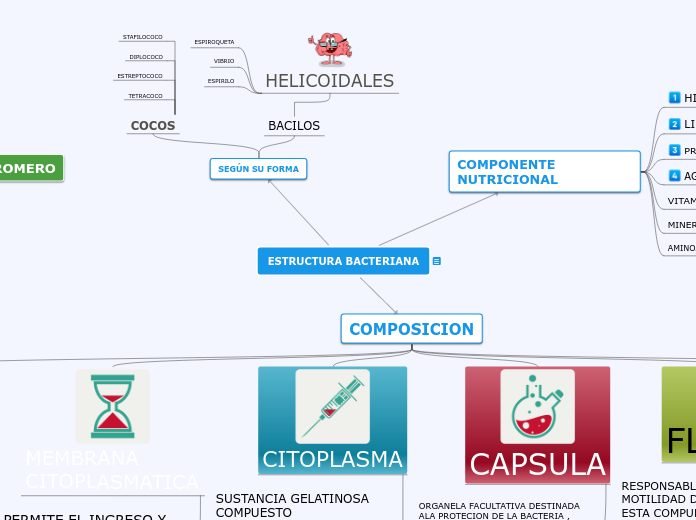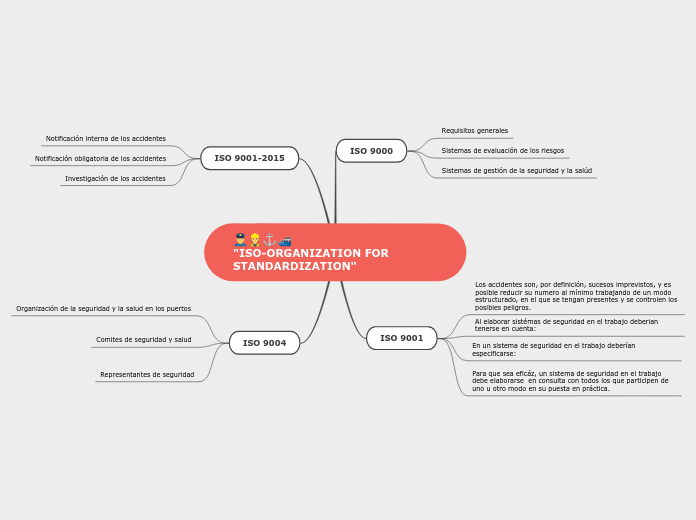USO ADECUADO DE EPP EN ACCIONES DE DESINFECCIÓN Y FUMIGACIÓN
The part of speech is a category to which a word is assigned according to its syntactic functions. In English the main parts of speech are noun, pronoun, adjective, determiner, verb, adverb, preposition, conjunction, and interjection.
FUMIGACIÓN
A preposition is one of the most exciting parts of grammar. A preposition is used to describe the location of something in relation to something else.
Acción que consiste en la eliminación de plagas
When a preposition consists of one word it is called single or simple preposition.
Utiizando:
Gases
Vapores
Polvos
DESINFECCIÓN
An interjection is used to express emotion in a sentence.
Think of other interjections!
Proceso para matar la gran mayoría de:
Agentes infecciosos
Gérmenes
EQUIPOS DE PROTECCION PERSONAL
An adverb is used to describe a verb, but it can also describe an adjective or another adverb.
Adverbs normally help paint a fuller picture by describing how something happens.
Equipo o dispositivo utilizado por el personal humanitario
Para:
Salvaguardar su salud en toda las actividades
Aumentar su seguridad
Protegerlo de los riesgos
BIOSEGURIDAD
A numeral is a word or phrase that describes a numerical quantity.
Some theories of grammar use the word 'numeral' to refer to cardinal numbers that act as a determiner to specify the quantity of a noun, for example the 'two' in 'two hats'.
Conjunto de medidas que se toman para:
Accidentes de exposición a materiales infecciosos
Controlar
Prevenir
CONSIDERACIONES GENERALES
A pronoun is a word that can be used in place of a noun, typically after the noun itself has already been stated.
Indefinite
Unlike demonstrative pronouns, which point out specific items, indefinite pronouns are used for non-specific things. This is the largest group of pronouns. All, some, any, several, anyone, nobody, each, both, few, either, none, one, and no one are the most common.
None, Several
Relative
Relative pronouns are used to add more information to a sentence. Which, that, who (including whom and whose), and where are all relative pronouns.
Which, Where
Interrogative
Interrogative pronouns are used in questions. Although they are classified as pronouns, it is not easy to see how they replace nouns. Who, which, what, where, and how are all interrogative pronouns.
Which, Who
Realizar desinfección del calzado
Reciprocal pronouns are used for actions or feelings that are reciprocated. The reciprocal pronouns are each other and one another.
Each other, one another
Siempre colocar el EPP en pares
A reflexive pronoun ends with ...self or ...selves and refers to another noun or pronoun in the sentence (usually the subject of the sentence). The reflexive pronouns are myself, yourself, herself, himself, itself, ourselves, yourselves, and themselves.
Itself, Himself
El EPP debe cubrir la mayor parte del cuerpo
Demonstrative pronouns are used to demonstrate (or indicate). This, that, these, and those are all demonstrative pronouns.
This, These
Colocar el EPP en un lugar limpio
Possessive pronouns are used to show possession. The possessive pronouns are mine, yours, his, hers, ours, and theirs.
His, Your
Usar ropa y zapatos de trabajo
The personal pronouns are I, you, he, she, it, we, they. More often than not (but certainly not always), they replace nouns representing people.
He, They
Buenas prácticas para el uso correcto del EPP
An adjective is a word that's used to describe a specific noun and to provide more detail to the listener.
Dejar sus pertenencias de valor en un lugar seguro
Uñas cortas
Mantener la barba corta
Tomar signos vitales
Superlative adjectives demonstrate a higher level of comparison between entities.
She is the prettiest princess.
No utilizar bisutería
Mantener el cabello recogido
Expresses a comparison between two entities or groups of entities in quality or degree.
He is taller than she is.
¿Qué EPP se requiere?
A noun is defined as a person, place, thing or idea. Proper nouns always begin with a capital letter. Common nouns, which are general words, such as 'cars,' are not capitalized.
Protección auditiva
Botas de caucho
Guantes
Compound nouns are words where two nouns have been stuck together to make a new noun. Compound nouns should be written as one word, without a hyphen.
Candlestick
Gafas de protección
A noun which refers to a group of things/people.
Family, Class
Mascarilla N95
Countable nouns are nouns that can be counted, even if the number might be extraordinarily high.
Uncountable nouns are nouns that come in a state or quantity which is impossible to count; liquids are uncountable, as are things which act
like liquids.
Cats, Rain
Traje de protección
Proper nouns are the names of specific people or places. They should always begin with a capital letter.
Create sentences
Mary, Paris









